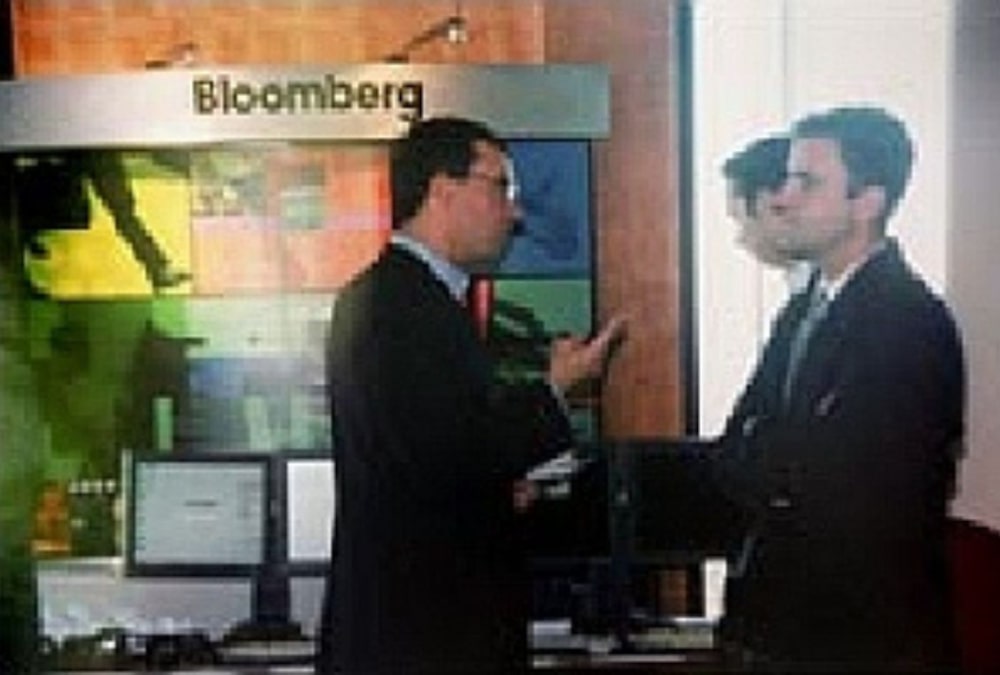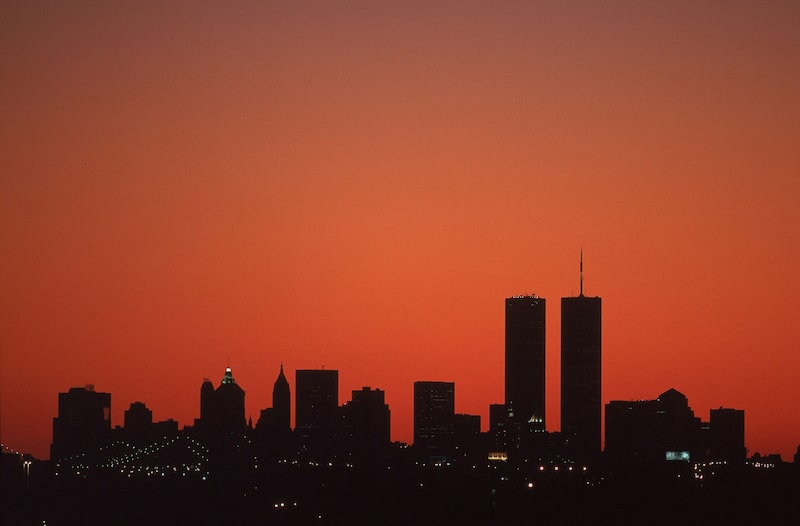Bloomberg Opinion — By David Shipley
Twenty years ago, on Sept. 11, 2001, at 8:46 a.m., American Airlines Flight 11 from Boston tore into One World Trade Center, the North Tower, hitting between the 93rd and 99th floors. Just above, on the 106th and 107th floors, was Windows on the World, the Trade Center’s landmark restaurant with views that encompassed New York City. There that morning for a conference were three employees from Bloomberg — Peter Alderman, Bill Kelly and Paul Ortiz. They were among the nearly 3,000 people who died on Sept. 11, more than 1,400 of whom were in the North Tower.
No one who was at Windows that morning survived. Escape was cut off from above and below. A phone call to emergency operators from Christopher Hanley, a conference attendee, tells part of the story.
“We have smoke and it’s pretty bad.”
“We have about 100 people here. We can’t get down the stairs.”
“I can see smoke coming up from outside the windows.”
“We can’t open the windows unless we break them.”
“Please hurry.”
At 10:28 a.m., one hour and 42 minutes after the Boeing 767 crashed into the building, the tower collapsed.

This photograph is thought to be the last one taken that morning from the restaurant. Eerily, it shows Alderman and Kelly at the Bloomberg booth, talking with Hanley. The photographer, who may have left the conference to go downstairs to get more film, remains unidentified.
What were they doing? Alderman and Kelly were there to represent Bloomberg at the Risk Waters Financial Technology Congress. Hanley worked for Radianz, a financial services company. (Ortiz, who isn’t in the picture, was a field technician, there to make sure everything worked.) In other words, it was the kind of unremarkable moment that is swept away by time — unless history, circumstance or tragedy give it weight and meaning.
In the hope of holding onto and honoring the memory of Peter Alderman, Bill Kelly and Paul Ortiz, here are some remembrances, drawn from conversations with people who knew them.
It was at the Ivy Inn, a bar in Princeton, New Jersey, that you could tell something about Peter Alderman. He was the first to load up the jukebox with $10, generally starting with Fleetwood Mac, so everyone in the place could dance. He was also the first to buy someone a beer or to start chatting with a person who had been sitting on the edge of the room, setting them at ease with a joke or a question. At the end of the night, he was a big fan of the chicken cheesesteak with bacon from Hoagie Haven, where a bench with his name now sits outside on Nassau Street.
Peter had been in Princeton for Bloomberg’s yearlong training program in finance. When the free housing at the Summerfield Suites on Route 1 came to an end, he rented a place in town with a few other guys — an apartment with barely any furniture except for a gray sleeper sofa, a ping-pong table and a DVD player to watch “Caddyshack.” Given the “Animal House” possibilities, Peter defied norms, keeping his room neat as a pin. He was also always on time. More to the point, he was always there — present, that is. He’d be present in conversation at 1:45 a.m. when the Ivy Inn was closing and equally present the next morning, showered and out the door and sponging up options pricing before most everyone else. He never seemed to be itching to be anywhere other than where he was.
The guy with the wide smile and thinning hair was one of the first in his training class to get picked for a job at headquarters in New York. That happened in the late summer of 2001; in only a few weeks, the 25-year-old was assigned to a conference where he was going to have to describe the nitty-gritty details of electronic trading programs to potential customers. He was thrilled to get the call, he told a friend the night before, on Sept. 10, and because he took such joy in your successes, you were happy for him, too.
It was when the day was over that you could tell something about Bill Kelly. The 30-year-old in the green tie would flip on some music — classic rock, Philly soul — and anyone who was around would take a few minutes to shoot the breeze. The scene was loose, funny, familial. Romance, faith, politics: All these were fair game. And sports, with special intensity reserved for Bill’s beloved Philadelphia Eagles and their perennial foe, the New York Giants. That everyone present worked for Tradebook — a new business set off from the rest of the company and one that cultivated a slightly buccaneering spirit — only added to the intimacy.
Being with Bill meant trying to get him to do a few things he didn’t want to do. Like talk about himself; he was more interested in others. Or buy him a round. He steadfastly refused, so much so that a game called “Give Bill a Dollar” was devised to pay him back. Eventually, friends who’d regularly been unable to get him a pint of Guinness decorated his Ford Fiesta with dollar bills — pinned under the wipers, jammed in the cracks, stuffed under the gas tank flap, impaled on the antenna. Bill had no choice but to take the money — if he wanted to be able to drive to work that day. These were the same friends he’d taken to Atlantic City to teach them craps — a game he loved because, unlike poker, you were rolling for the table, not against it; you were pulling for others, not just yourself.
Bill was a tinkerer — he built his own golf clubs, tended to an old Jeep, and lavished attention on surfboards, which he rode off Long Beach Island, in New Jersey. The level of care extended to others: nieces and nephews, who were showered with presents; customers, whose thorny technical questions he gamely answered at all hours; pretty much everyone in his orbit. It surprised no one, then, that he volunteered to work on Sept. 11, to go to Windows, even though he was supposed to be off. Also unsurprising were his messages that morning, sent to friends from his Blackberry after the explosion. He could hear firefighters, he wrote. He knew there would be a rescue. Helicopters were coming to get people off the roof and save them.
It was in the atrium of One Liberty Plaza that you could tell something about Paul Ortiz. That’s where, in the heart of the Financial District, the team that installed and maintained Bloomberg terminals on Wall Street would gather for lunch. During the day, the techs led a nomadic life — there was no time to return to the office uptown between setups and repairs. The hours were long, too — early mornings and late nights so that you wouldn’t interrupt the trading day. Lunch was the time to check in. While the guys — and they were all guys then — would grab pizza at Majestic or sesame chicken at the Chinese place or something from Burger King and sit at the atrium’s tables, Paul, who was 21, would sometimes be joined by his wife and nine-month-old daughter, and the family would have lunch together.
As the youngest member of the crew, Paul often seemed the oldest, just because he had it all together. Back then, techs wore ties and dress shirts. They also spent a lot of time on their hands and knees underneath desks, sorting out wiring. Most emerged with shirttails hanging out, ties askew. Except for Paul. He always looked crisp, the slim New York kid with the wispy moustache. This matter-of-fact maturity was visible in other ways. If you were having trouble with a job late at night and called for help with a stubborn router, Paul would come in from Brooklyn to help fix the problem, even if it was a Friday. But if the choice was between blowing off steam after work or going home, he chose home and Star, his wife, and Rebecca.
On Sept. 11, Paul had gotten to Windows early to set up the booth and make sure the equipment was working for the start of the conference at 8:30. One P.C. refused to connect. He quickly arranged for a new one — shipping it downtown via a car service, then past Trade Center security, which had been hardened after the 1993 bombing, and then up a couple different elevators — all with a looming deadline. As the conference was getting underway, he was on his Nextel walkie-talkie, going through a few final checks with the office, when the line went dead. When the office tried to call back, there was no response. Everyone was surprised. Paul never dropped a call, and he always answered.
This column does not necessarily reflect the opinion of the editorial board or Bloomberg LP and its owners.
David Shipley is senior executive editor of Bloomberg Opinion. He was deputy editorial page editor and op-ed page editor of the New York Times, and served in the Clinton administration as special assistant to the president and senior presidential speechwriter. Shipley is co-author of “Send,” a guide to email.

